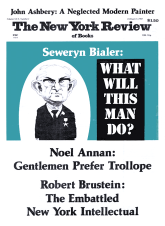To the Editors:
On August 1, 1975, the United States, the Soviet Union, Canada, and thirty-two European countries signed the Helsinki Accords, formally known as the Final Act of the Conference on Security and Cooperation in Europe. In Article VII, participating nations entered into international covenant to “…respect human rights and fundamental freedoms, including the freedom of thought, conscience, religion or belief…. They confirm the right of the individual to know and act upon his rights and duties in this field” (emphasis added).
Yuri Orlov, a respected Soviet physicist and champion of human rights, was the first to recognize that these agreed upon principles of international accountability would be moot without procedures to monitor, record, and transmit “…to the participating states information on violations of the humanitarian provisions of the Final Act…” and that “interference with the free exchange of information is a fundamental violation of the spirit and letter of the Final Act….”
In May, 1976, eleven human rights activists in the Soviet Union formed the Moscow Helsinki Watch Group with the expressed goal of assuming this responsibility. The chairman was Yuri Orlov. Their perspective—that the observance of human rights can no longer be an internal matter of the individual signatories—has led to the formation of Helsinki watch groups in other countries, calling upon their own governments to respect these international commitments.
For his work in this regard, Yuri Orlov was arrested in February 1977. Following a closed trial, in which he was denied the right to call witnesses and to examine evidence, he was convicted of “anti-Soviet agitation” and sentenced to seven years in a strict regime labor camp followed by five years of internal exile.
Yuri Orlov’s latest scientific work lies well within established, although not well known, physical theories. He has applied the non-classical logic of quantum theory to describe psychological processes. This work provides a framework in physical law for understanding how people form irreducible wholes in perception and equivalence classes in cognition. Orlov has given a basis for representing paradox, ambiguity and doubt, and for the interference of thought processes. This work has applications to creativity and mental functioning in health and disease. He has provided a model for choice and the functioning of the will—the capacity to make and implement choice.
Yuri Orlov wrote this scientific work from the mental and physical isolation of his imprisonment. For this act of practicing science, his notes and correspondences were confiscated. Further, he was placed into the PKT, a separate “prison within the prison,” for six months and subjected to increasing duress.
For exposing a provocation planned against him, Orlov was accused of slander, and isolated again for six months. A third six-month isolation was imposed in 1981. Actions have been taken to deny him his degree and academic stature as the highest ranking imprisoned Soviet scientist. Adequate clothing has been denied him in an unheated isolation cell. Two wardens are assigned to punish him for exercising or not fulfilling his work norm. Orlov appears to have contracted tuberculosis and has “constant high temperature and blood-spitting,” but he has not been given proper treatment. He has twice been told that he will not leave the camp alive. His own case vindicates the actions taken by Orlov and the Moscow Watch Group to monitor compliance with the Helsinki Accords and validates the necessity of the Humanitarian provisions.
It is the duty of scientists and humanitarians alike to take positive action on behalf of Yuri Orlov. I believe that we must condemn the brutal treatment of this moral hero; and we must cry out for the “scientific amnesty” of this uncommonly qualified and competent scientist. The persecution of Yuri Orlov is a crime against science and an attack against civilized people everywhere, and against the fundamental principles of human rights.
Eddie Oshins
Menlo Park, California
This Issue
February 3, 1983



